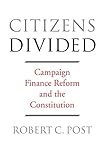Citizens Divided : Campaign Finance Reform and the Constitution / Robert C. Post.
Material type: TextSeries: The Tanner Lectures on Human Values ; 14Publisher: Cambridge, MA : Harvard University Press, [2014]Copyright date: ©2014Edition: Pilot project,eBook available to selected US libraries onlyDescription: 1 online resource (264 p.)Content type:
TextSeries: The Tanner Lectures on Human Values ; 14Publisher: Cambridge, MA : Harvard University Press, [2014]Copyright date: ©2014Edition: Pilot project,eBook available to selected US libraries onlyDescription: 1 online resource (264 p.)Content type: - 9780674970939
- 9780674369603
- 342.73078 23
- online - DeGruyter
| Item type | Current library | Call number | URL | Status | Notes | Barcode | |
|---|---|---|---|---|---|---|---|
 eBook
eBook
|
Biblioteca "Angelicum" Pont. Univ. S.Tommaso d'Aquino Nuvola online | online - DeGruyter (Browse shelf(Opens below)) | Online access | Not for loan (Accesso limitato) | Accesso per gli utenti autorizzati / Access for authorized users | (dgr)9780674369603 |
Browsing Biblioteca "Angelicum" Pont. Univ. S.Tommaso d'Aquino shelves, Shelving location: Nuvola online Close shelf browser (Hides shelf browser)

|

|

|

|

|

|

|
||
| online - DeGruyter Athens / | online - DeGruyter Between Pagan and Christian / | online - DeGruyter Capital in the Twenty-First Century / | online - DeGruyter Citizens Divided : Campaign Finance Reform and the Constitution / | online - DeGruyter Contraband : Louis Mandrin and the Making of a Global Underground / | online - DeGruyter Culling the Masses : The Democratic Origins of Racist Immigration Policy in the Americas / | online - DeGruyter Cultures of Milk : The Biology and Meaning of Dairy Products in the United States and India / |
Frontmatter -- Contents -- I. The Lectures -- 1. First Lecture: A Short History of Representation and Discursive Democracy -- 2. Second Lecture: Campaign Finance Reform and the First Amendment -- II. Commentary -- 3. Out-Posting Post -- 4. Legitimacy, Strict Scrutiny, and the Case Against the Supreme Court -- 5. Free Speech as the Citizen’s Right -- 6. Citizens Deflected: Electoral Integrity and Political Reform -- III. Response -- 7. Representative Democracy -- Notes -- Acknowledgments -- Commentators -- Index
restricted access online access with authorization star
http://purl.org/coar/access_right/c_16ec
The Supreme Court's 5-4 decision in Citizens United v. Federal Election Commission, which struck down a federal prohibition on independent corporate campaign expenditures, is one of the most controversial opinions in recent memory. Defenders of the First Amendment greeted the ruling with enthusiasm, while advocates of electoral reform recoiled in disbelief. Robert Post offers a new constitutional theory that seeks to reconcile these sharply divided camps. Post interprets constitutional conflict over campaign finance reform as an argument between those who believe self-government requires democratic participation in the formation of public opinion and those who believe that self-government requires a functioning system of representation. The former emphasize the value of free speech, while the latter emphasize the integrity of the electoral process. Each position has deep roots in American constitutional history. Post argues that both positions aim to nurture self-government, which in contemporary life can flourish only if elections are structured to create public confidence that elected officials are attentive to public opinion. Post spells out the many implications of this simple but profound insight. Critiquing the First Amendment reasoning of the Court in Citizens United, he also shows that the Court did not clearly grasp the constitutional dimensions of corporate speech. Blending history, constitutional law, and political theory, Citizens Divided explains how a Supreme Court case of far-reaching consequence might have been decided differently, in a manner that would have preserved both First Amendment rights and electoral integrity.
Mode of access: Internet via World Wide Web.
In English.
Description based on online resource; title from PDF title page (publisher's Web site, viewed 08. Aug 2023)


